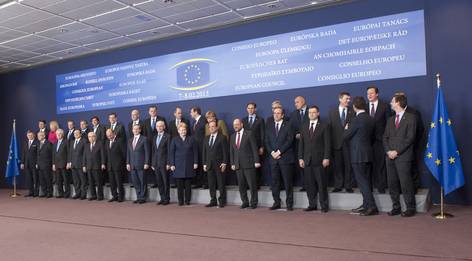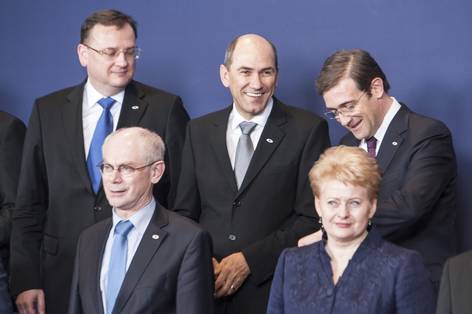NEWS
The Prime Minister of the Republic of Slovenia, Janez Janša: “Slovenia to remain a net recipient from the EU budget”
“Slovenia’s aim in the negotiations was to maintain its position of a net recipient of EU funds. Compared to the EU28 average, Slovenia has made progress over the past seven years in spite of the crisis. This is particularly true for its Western cohesion region. Nevertheless, Slovenia will remain a net recipient from the EU budget until 2020. Moreover, its financial position will significantly improve,” said Prime Minister Janša at the conclusion of the negotiations on the next Multiannual Financial Framework (2014-2020).
In the current financial perspective, Slovenia’s net financial position is +.87% of its GNI, and in the period 2014-2020, the country will be entitled to +0.3% of its GNI. At the annual level, it means about EUR 370 million, and in the entire period 2014-2020 an approximately a half a billion euros improvement on the period 2007-2013.
The European Council approved the seven-year financial perspective 2014-2020 leading to a total budget size of EUR 959 billion or 1.0% of the EU’s GNI. The Prime Minister highlighted that the EU has cut its budget for the first time in history. This means that there will be approximately 3.5% or EUR 30 billion less money available than in the current 2007-2013 period: Cohesion Policy funds are to be reduced by 8.4% and Common Agricultural Policy funds by 11.3%. More funds than before will be allocated for research, innovation and education, particularly of young people, and infrastructure, which is welcome in particular from the perspective of the strengthening of competitiveness, growth and the creation of new jobs in the EU. A special programme worth EUR 6 billion has been launched to deal with the problem of unemployment of young people in EU regions in which the proportion of unemployed young people is greater than 25%. It is a special programme that has been given a warm welcome,” said the Prime Minister.
Cohesion Policy funds were threatened with a 43% cut before the November session. In the course of the negotiations, we have succeeded in boosting the cohesion envelope by almost half a billion euros so that, under today’s agreement, Slovenia will be entitled to receive almost three billion euros over the next seven years.
Under this arrangement, we have succeeding in securing additional EUR 308 million for East Slovenia, which had been threatened with a 45% decline in Cohesion Policy funding. This amount also includes a special supplement totalling EUR 75 million that was agreed in the final stage of the negotiations. West Slovenia, which is now categorised as a developed EU region, will continue to be entitled to 60% of the Cohesion Policy funds due to the ‘security network’, which Slovenia did its best to achieve. Without it, the Cohesion Policy funding would shrink to half its previous size.
In the area of the Common Agricultural Policy, Slovenia received a total of almost EUR 1.6 billion, of which slightly more than EUR 744 million for rural development. Slovenia succeeded in negotiating an additional EUR 150 million for this purpose. Slovenia can expect to receive another EUR 500 million in the framework of the Common Fisheries Policy and LIFE programme.
In the next financial period, Slovenia will thus be entitled to approximately EUR 5.3 billion from the EU budget, of which EUR 4.5 billion within national envelopes. In this respect, the Prime Minister also highlighted the importance of the country’s absorption capacity, which currently fairly good. “We will be able to use the EU funds available under the current financial perspective unless there are major delays,” said the Prime Minster and pointed out that between EUR 300 million and EUR 500 million would be in jeopardy in case of any major delays.
According to Prime Minister Janša, these negotiations were very similar to those in 2005, with the difference, however, that those negotiations were not successful, and now the agreement has been achieved. As a matter of fact, nobody has expressed extreme satisfaction with it, as the budget has been reduced for the first time in history. It is a ‘universal compromise’ according to the Prime Minister who added that the budget is, indeed, not an ideal one but, given the current situation in Europe, “comes considerably closer to the ideal than if its structure remained the same as in the current financial perspective”. He also stressed the role of the European Parliament which now, for the first time, has the function of approving the budget and expressed his view that “although the figures do not reveal everything that the European Parliament wished to achieve”, the Members of the European Parliament would confirm the multiannual financial framework after a thorough discussion.
In his answer to a journalist’s question, Prime Minister Janša also confirmed having met with the Prime Minister of Croatia, Zoran Milanović, with whom he discussed the possible solution of the dispute regarding the transferred deposits of the former LB bank in Zagreb. The Prime Minister said that after the recent meetings and discussions at different levels “a certain solution is on the horizon, but it is still a rough concept”. He also expressed his belief that “the idea is promising, but it will take a month or so of careful study and coordination”, which, according to him, will not take place in front of the cameras. If everything goes as planned, the proposed solution could be tabled for discussion some time in the middle of the next month. “If the attempt is successful, Slovenia will also intiate the process of ratification of Croatia’s accession treaty,” concluded the Prime Minister.







